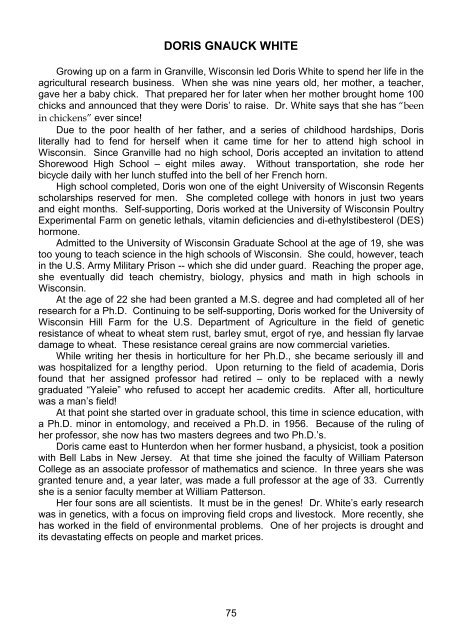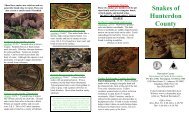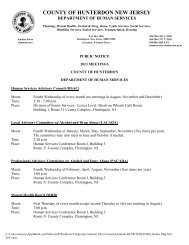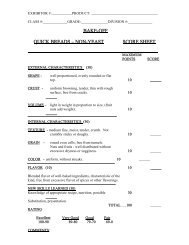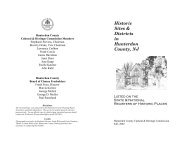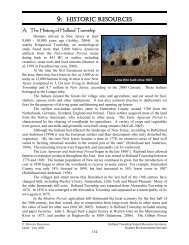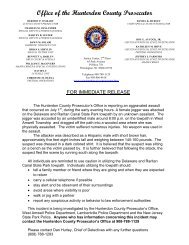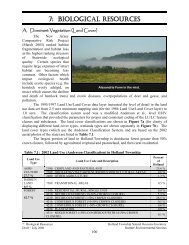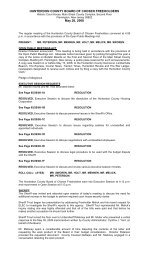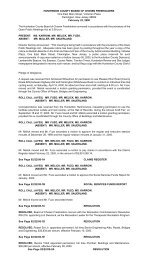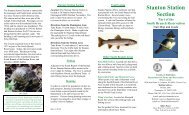Create successful ePaper yourself
Turn your PDF publications into a flip-book with our unique Google optimized e-Paper software.
DORIS GNAUCK WHITE<br />
Growing up on a farm in Granville, Wisconsin led Doris White to spend her life in the<br />
agricultural research business. When she was nine years old, her mother, a teacher,<br />
gave her a baby chick. That prepared her for later when her mother brought home 100<br />
chicks and announced that they were Doris’ to raise. Dr. White says that she has “been<br />
in chickens” ever since!<br />
Due to the poor health of her father, and a series of childhood hardships, Doris<br />
literally had to fend for herself when it came time for her to attend high school in<br />
Wisconsin. Since Granville had no high school, Doris accepted an invitation to attend<br />
Shorewood High School – eight miles away. Without transportation, she rode her<br />
bicycle daily with her lunch stuffed into the bell of her French horn.<br />
High school completed, Doris won one of the eight University of Wisconsin Regents<br />
scholarships reserved for men. She completed college with honors in just two years<br />
and eight months. Self-supporting, Doris worked at the University of Wisconsin Poultry<br />
Experimental Farm on genetic lethals, vitamin deficiencies and di-ethylstibesterol (DES)<br />
hormone.<br />
Admitted to the University of Wisconsin Graduate School at the age of 19, she was<br />
too young to teach science in the high schools of Wisconsin. She could, however, teach<br />
in the U.S. Army Military Prison -- which she did under guard. Reaching the proper age,<br />
she eventually did teach chemistry, biology, physics and math in high schools in<br />
Wisconsin.<br />
At the age of 22 she had been granted a M.S. degree and had completed all of her<br />
research for a Ph.D. Continuing to be self-supporting, Doris worked for the University of<br />
Wisconsin Hill Farm for the U.S. Department of Agriculture in the field of genetic<br />
resistance of wheat to wheat stem rust, barley smut, ergot of rye, and hessian fly larvae<br />
damage to wheat. These resistance cereal grains are now commercial varieties.<br />
While writing her thesis in horticulture for her Ph.D., she became seriously ill and<br />
was hospitalized for a lengthy period. Upon returning to the field of academia, Doris<br />
found that her assigned professor had retired – only to be replaced with a newly<br />
graduated “Yaleie” who refused to accept her academic credits. After all, horticulture<br />
was a man’s field!<br />
At that point she started over in graduate school, this time in science education, with<br />
a Ph.D. minor in entomology, and received a Ph.D. in 1956. Because of the ruling of<br />
her professor, she now has two masters degrees and two Ph.D.’s.<br />
Doris came east to <strong>Hunterdon</strong> when her former husband, a physicist, took a position<br />
with Bell Labs in <strong>New</strong> <strong>Jersey</strong>. At that time she joined the faculty of William Paterson<br />
College as an associate professor of mathematics and science. In three years she was<br />
granted tenure and, a year later, was made a full professor at the age of 33. Currently<br />
she is a senior faculty member at William Patterson.<br />
Her four sons are all scientists. It must be in the genes! Dr. White’s early research<br />
was in genetics, with a focus on improving field crops and livestock. More recently, she<br />
has worked in the field of environmental problems. One of her projects is drought and<br />
its devastating effects on people and market prices.<br />
75


